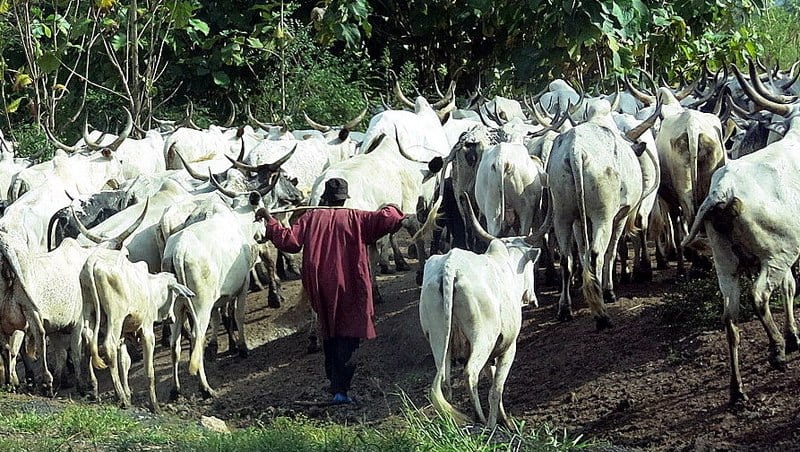 Photo Courtesy: Brendertogo, Wikimedia Commons
Photo Courtesy: Brendertogo, Wikimedia Commons
How Climate Change is Affecting Armed Groups in Nigeria
Conflict between Nigerian herdsmen and farmers dates back centuries, but has escalated drastically within the past year as climate change is driving herders south into Nigeria’s central farmland. 75% of the grassland in northern Nigeria is now desertified, which has reconfigured the geography and landscape of Nigeria entirely.
In the north-east, the number of rain days has dropped by over 50%, while erratic rainfall and temperatures have increased in the north-west. Abnormal weather patterns and desert encroachment are resulting in ecological and economic destabilization within the semi-arid region of northern Nigeria, particularly impacting the livestock and farming sectors. Changing precipitation patterns are reducing crop yields for farmers and disrupting water supplies for herdsmen, significantly altering traditional practices and leaving many farms and villages abandoned.
Nomadic Fulani herdsmen are in constant search for water holes and rangeland for their cattle. Due to land scarcity, herders are permanently relocating to areas that are already inhabited by farmers in southern Nigeria. Fulani herdsmen and Bachama farmers must now compete over scarce fertile land, furthering tension and violence between the two groups. Herdsmen and farmers are resorting to violence to maintain their livelihoods.
According to the Armed Conflict Location & Event Data Project, armed Fulani have killed approximately 1,000 civilians this year, considerably more than the estimated 200 killed by the Islamic terrorist group Boko Haram. Conflict has been fueled by the accessibility of weapons in the Sahel, particularly within Nigeria. Trafficking of looted weapon arsenals of former Libyan dictator Muammar Gaddafi allows civilian access to weaponry, making the conflict even deadlier.
Nigeria already has a “north-south, Muslim-Christian divide.” Therefore, the conflict is advancing pre-existing religious tensions. The Fulani herders, who are predominantly Muslim, are migrating to the Middle Belt Region, where Christian Bachama farmers generally live. In April, two Catholic priests and 17 congregants were killed in the state of Benue by Fulani men. Reports have documented clergymen, law enforcement officials and civilians being kidnapped by herdsmen.
The Nigerian government has long denied that climate change is exacerbating conflict and has generally done a poor job at easing tensions between herdsmen and farmers. States such as Benue have passed laws that ban herdsmen from grazing their cattle on open land. Wole Soyinka, a Nobel laureate and prominent Christian leader in southern Nigeria, argues that the ban is not harsh enough and believes Fulani herdsmen should be declared terrorists by the state, therefore allowing police greater authority when handling the conflict. On the other hand, many northerners believe the grazing ban further instigates the Fulani’s violence.
At its foundation, the Fulani-Bachama conflict is about scarce land and resources. With 70% of the Nigerian labor force employed in agriculture, and livestock production accounting for 35% of the regional GDP, it is evident that Sahelian livelihoods are heavily reliant on a fertile environment. Diversifying livelihoods and exploring other land uses beyond food production could therefore be the next step to mitigating conflict and addressing changing climates.
The Nigerian Middle Belt has potential for developing a mining sector, with a gypsum industry growing in Benue. Nigeria’s Minister of State for Mines and Steel Development, Abubakar Bawa Bwari, believes “Mining can play a role to reduce conflict between farmers and pastoralists by providing a third economic opportunity for those who live in rural areas.” Last year, mining only accounted for 0.03% of Nigeria’s GDP. However, the government has launched policy initiatives to further develop the mining sector in hopes that mining will soon contribute approximately 7% of GDP.
Though natural resource extraction may provide immediate and short-term mitigation, over-reliance on mining could result in what is known as the “resource curse”. This phenomenon refers to the paradox that countries with an abundance of natural resources experience less economic growth and political transparency than countries with fewer resources.
As death tolls rise, and fears of famine, economic collapse and civil war grow amongst the Nigerian people, the government needs to intervene to stop the tribal violence. The Nigerian government must be held accountable for their failure to ease tensions and protect its citizens. Deadly conflicts have ravished the country since Boko Haram gained influence within the region in 2003 and will continue to do so until the underlying sources of instability are adequately addressed. Prioritizing climate change, particularly as a national security concern, will assist the Nigerian government in mitigating a conflict that has such deep roots in the environment.





